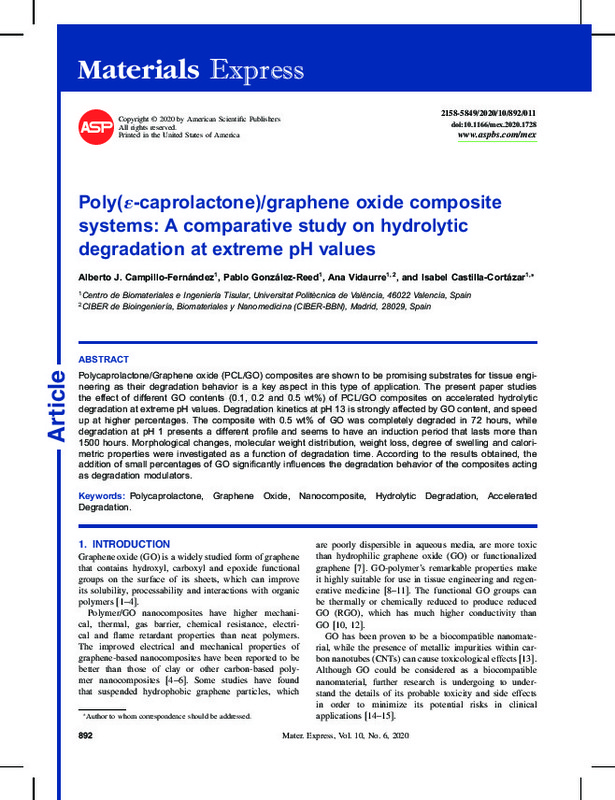JavaScript is disabled for your browser. Some features of this site may not work without it.
Buscar en RiuNet
Listar
Mi cuenta
Estadísticas
Ayuda RiuNet
Admin. UPV
Poly(epsilon-caprolactone)/Graphene oxide composite systems: a comparative study on hydrolytic degradation at extreme pH values
Mostrar el registro sencillo del ítem
Ficheros en el ítem
| dc.contributor.author | CAMPILLO FERNANDEZ, ALBERTO JOSE
|
es_ES |
| dc.contributor.author | González-Reed, Pablo
|
es_ES |
| dc.contributor.author | Vidaurre, Ana
|
es_ES |
| dc.contributor.author | Castilla Cortázar, María Isabel Cecilia
|
es_ES |
| dc.date.accessioned | 2021-09-09T03:35:53Z | |
| dc.date.available | 2021-09-09T03:35:53Z | |
| dc.date.issued | 2020-06 | es_ES |
| dc.identifier.issn | 2158-5849 | es_ES |
| dc.identifier.uri | http://hdl.handle.net/10251/171694 | |
| dc.description.abstract | [EN] Polycaprolactone/Graphene oxide (PCL/GO) composites are shown to be promising substrates for tissue engineering as their degradation behavior is a key aspect in this type of application. The present paper studies the effect of different GO contents (0.1, 0.2 and 0.5 wt%) of PCL/GO composites on accelerated hydrolytic degradation at pH 13 and pH 1. Degradation kinetics at pH 13 is strongly affected by GO content, and speed up at higher percentages. The composite with 0.5 wt% of GO was completely degraded in 72 hours, while degradation at pH 1 presents a different profile and seems to have an induction period that lasts more than 1500 hours. Morphological changes, molecular weight distribution, weight loss, degree of swelling and calorimetric properties were obtained as a function of degradation time. According to the results obtained, the addition of small percentages of GO significantly influences the degradation behavior of the composites acting as degradation modulators. | es_ES |
| dc.description.sponsorship | Isabel Castilla-Cortazar and Alberto J. Campillo-Fernandez are grateful for the support of the Spanish Ministry of Science, Innovation and Universities, through RTI2018-095872-B-C22/ERDE Ana Vidaurre would like to express her gratitude for the support of the Spanish Ministry of Science and Education, through the MAT2016-76039-C4-1-R Project, and also the support from CIBER-BBN, an initiative funded by the Sixth National R&D&i Plan 2008-2011, Iniciativa Ingenio 2010, Consolider Program, CII3ER Actions financed by the Instituto de Salud Carlos III with assistance from the European Regional Development Fund. | es_ES |
| dc.language | Inglés | es_ES |
| dc.publisher | American Scientific Publishers | es_ES |
| dc.relation.ispartof | Materials Express | es_ES |
| dc.rights | Reserva de todos los derechos | es_ES |
| dc.subject | Polycaprolactone | es_ES |
| dc.subject | Graphene oxide | es_ES |
| dc.subject | Nanocomposite | es_ES |
| dc.subject | Hydrolytic degradation | es_ES |
| dc.subject | Accelerated degradation | es_ES |
| dc.subject.classification | MAQUINAS Y MOTORES TERMICOS | es_ES |
| dc.subject.classification | FISICA APLICADA | es_ES |
| dc.title | Poly(epsilon-caprolactone)/Graphene oxide composite systems: a comparative study on hydrolytic degradation at extreme pH values | es_ES |
| dc.type | Artículo | es_ES |
| dc.identifier.doi | 10.1166/mex.2020.1728 | es_ES |
| dc.relation.projectID | info:eu-repo/grantAgreement/MINECO//MAT2016-76039-C4-1-R/ES/BIOMATERIALES PIEZOELECTRICOS PARA LA DIFERENCIACION CELULAR EN INTERFASES CELULA-MATERIAL ELECTRICAMENTE ACTIVAS/ | es_ES |
| dc.relation.projectID | info:eu-repo/grantAgreement/AEI/Plan Estatal de Investigación Científica y Técnica y de Innovación 2017-2020/RTI2018-095872-B-C22/ES/NUEVO DISPOSITIVO BIOACTIVO PARA LA REGENERACION DE LESIONES DE LA MEDULA ESPINAL./ | es_ES |
| dc.rights.accessRights | Abierto | es_ES |
| dc.contributor.affiliation | Universitat Politècnica de València. Departamento de Física Aplicada - Departament de Física Aplicada | es_ES |
| dc.contributor.affiliation | Universitat Politècnica de València. Departamento de Termodinámica Aplicada - Departament de Termodinàmica Aplicada | es_ES |
| dc.description.bibliographicCitation | Campillo Fernandez, AJ.; González-Reed, P.; Vidaurre, A.; Castilla Cortázar, MIC. (2020). Poly(epsilon-caprolactone)/Graphene oxide composite systems: a comparative study on hydrolytic degradation at extreme pH values. Materials Express. 10(6):892-902. https://doi.org/10.1166/mex.2020.1728 | es_ES |
| dc.description.accrualMethod | S | es_ES |
| dc.relation.publisherversion | https://doi.org/10.1166/mex.2020.1728 | es_ES |
| dc.description.upvformatpinicio | 892 | es_ES |
| dc.description.upvformatpfin | 902 | es_ES |
| dc.type.version | info:eu-repo/semantics/publishedVersion | es_ES |
| dc.description.volume | 10 | es_ES |
| dc.description.issue | 6 | es_ES |
| dc.relation.pasarela | S\401589 | es_ES |
| dc.contributor.funder | Instituto de Salud Carlos III | es_ES |
| dc.contributor.funder | Agencia Estatal de Investigación | es_ES |
| dc.contributor.funder | European Regional Development Fund | es_ES |
| dc.contributor.funder | Ministerio de Economía y Competitividad | es_ES |
| dc.contributor.funder | Centro de Investigación Biomédica en Red en Bioingeniería, Biomateriales y Nanomedicina | es_ES |








